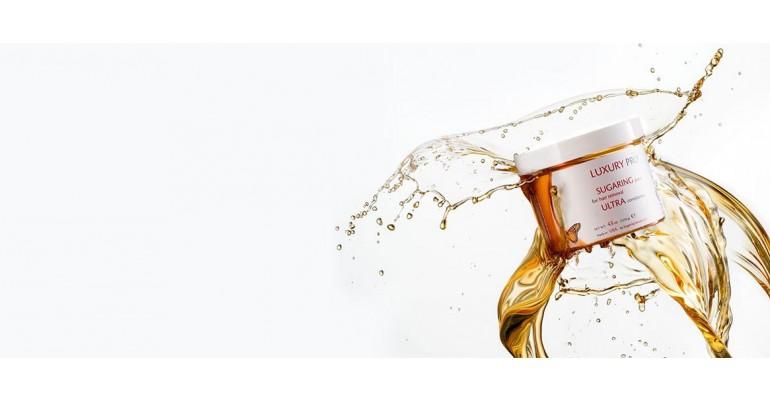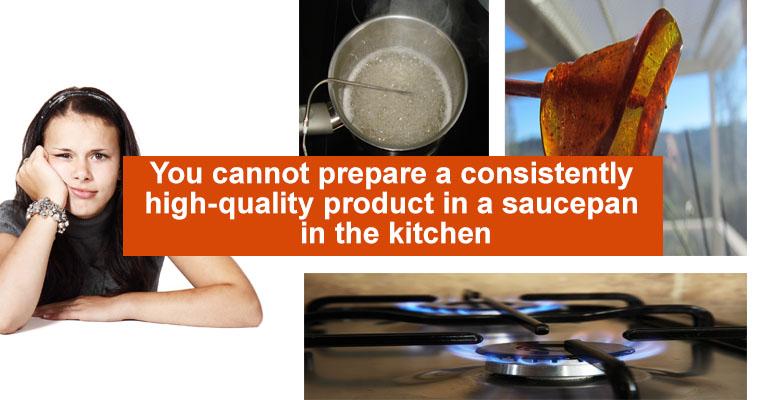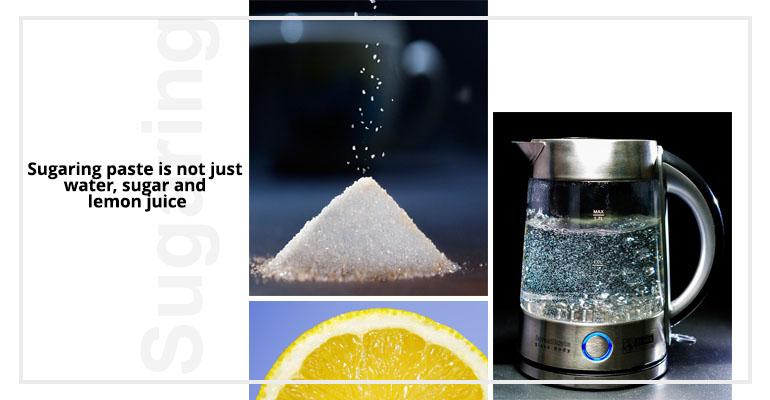
There are so many sugar paste manufacturers. How to choose the right one?
I often hear practitioners say "all sugar pastes are the same" or "I gained so much experience that I can work with anything: be it honey or tar". That's a ridiculous statement and it always makes me laugh. I would love to give you a jar of honey and send you to a client.
The quality and composition of the sugar paste is what makes the difference.
Why do people go with a luxury car when they can choose? Well, it’s like being asked, would you like a house or a shed? Obviously, people are attracted to quality. Then why do people think first about the price and don't see the low quality that comes with it?
Producers of the sugar paste and wax, and there are a lot of them, have different approaches toward their business. Very often people are guided by an itch for easy gain, as sugaring paste consists of very simple ingredients: sugar, water and lemon juice! So easy right?
Everybody can start cooking this miracle in a pan in their kitchens, so all the sugar paste manufacturers are just cheaters and charlatans, aren't they? If you think about it, bread is just flour, water and eggs. Shampoo is water and some caustic soda. Beer is simply hop, malt, yeast and water. Read more about homemade sugaring paste: https://sugaringfactory.com/blog-of-sugaring-factory/4-reasons-to-not-use-homemade-sugaring-paste-for-hair-removal.

So why do manufacturers try to make money out of...water?
Everybody who tries to simplify things forget about another very important and expensive ingredient: the labor and people's knowledge multiplied by time spent on producing these goods.
It seems like labor isn’t worth anything and things should be sold at cost and that's what is considered to be the "fair business".
But sugar paste is not only sugar, water and lemon juice. Sugar paste is, first of all, laboratory researched, with work of chemists to develop the perfect formula. It takes a lot of work to learn the process and ability to distinguish monosaccharide sucrose from fructose, to understand the fermentative hydrolyze specifics, and it takes a lot of hours to find the optimal proportion of the ingredients.
Sum up knowledge of marketing and ability to organize an efficient and honest business, rent, salary, expensive equipment, logistics and on top of that, as much as your conscience will allow you to, add a bit of interest margin with a tiny bit of profit.
Do you still think it's an easy thing?
Yes, you can cook sugaring paste at home in your kitchen. The web is full of recipes like: "2 lemons, 2 glasses of water, 2 kg of sugar". And there are many practitioners who make caramel in a saucepan and sincerely believe that they hacked the system and "if there's no difference, there's no reason to pay more".
Almost all manufacturers started from the "garage" and "kitchen" and that's a usual story. ALL producers of sugar paste started from scratch. And there's nothing bad about that. Practitioners started from small steps but soon they understood that along with their companies' growth they needed to "grow" their skills, knowledge in managing people, they needed to learn to delegate tasks, teach others, take more responsibility. And they grew, as much as they could.
The first thing the "home chefs" face is stability and product quality. The quality of ingredients can change often, not to mention it's enormously difficult to get the same density and elasticity of the paste every time. What water acidity and hardness to choose? What ingredients? What equipment to use? How many types of autoclaves and fluid meters you know and which is the only one you can use for sugaring? What is a "technical data sheet"? Sugar paste is one of the most difficult products in the cosmetic market. It's harder to produce than scrubs, lotions, gels and any other beauty product. You should not add any foreign matter or any chemicals, preservatives and colors to it. The "improving agents" immediately trigger the process of oxidation and the paste deteriorates or turns into a substance that doesn't even resembles the sugar paste. The main complexity of production is the extremely technical process requirements.
If your manufacturer often mixes up the density labels on the container it's the first sign of unprofessionalism.
It's not difficult to produce a relatively good light-colored product at home. After gaining minimal experience almost anyone will be able to produce the amount of paste enough for oneself and one's friends who also provide sugaring services. All the troubles of sugar paste producing start when the order for first 100 container comes in and you cannot make the whole amount of the paste with the strictly same parameters.

First of all, sugaring is skill and knowledge
It is the professionalism and efficiency poured into containers. And only after that, it's the product. There are a lot of manufacturers and it wouldn't be fair to encourage you to choose us. True, it doesn't sound like an ad, but I'll explain.
There are around 50 manufacturers. Two thirds of them produce homemade paste. Everybody knows the top three ones, just keep in mind they offer their products only in one country or in a few select countries. First of all, look at the quality of the product you buy. It's the most important thing. The second parameter is the price. The expensive product, no matter how wonderful it is, has no commercial value for you as a practitioner.
Look for the golden middle for yourself, try different hair removal brands https://sugaringfactory.com/contact-us/private-labeling to find the best one for yourself. From time to time check the market for the new manufacturers who compete with each other. You have the right to have the best. And the manufacturers' aim is to provide you with the best quality for affordable and fair price.


 Cart
Cart 